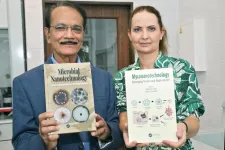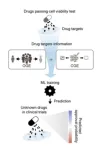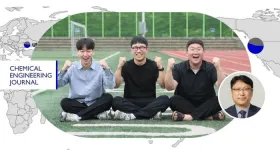(Press-News.org) This September 24–29, at the 10th Heidelberg Laureate Forum (HLF), 200 young researchers in mathematics and computer science will spend a week of scientific exchange with the recipients of the disciplines’ most prestigious prizes: the Abel Prize, ACM A.M. Turing Award, ACM Prize in Computing, Fields Medal, the Nevanlinna Prize as well as its continuation, the IMU Abacus Medal. Below are a few highlights of the upcoming program of the HLF as well as a breakdown of how to cover this unique event.
More than 30 laureates
Having over 30 groundbreaking and award-winning researchers in mathematics and computer science in one venue is not only a thrilling prospect for the next generation of scientists attending the 10th HLF, but for anyone who has an interest in these subjects and the pioneers they have produced. Livestream their lectures and panel discussions on the HLF website or catch them at your leisure on our YouTube channel, which is regularly updated.
200 of the brightest young minds in their fields
The HLF provides 200 selected young mathematicians and computer scientists from all around the world the opportunity to engage and exchange ideas with a vast network of peers and laureates from diverse backgrounds, all brimming with enthusiasm. Find out what drives the young researchers, what motivated them to pursue a career in mathematics or computer science and what they see as the greatest challenges of today. Leading up to this year’s HLF, we are shining a light on a select few of these young researchers in our HLFF Spotlight series, which will feature weekly releases on our HLFF Blog as well as several podcast episodes. Be sure to also check out some of the fascinating Spotlight articles and episodes from past HLFs!
A milestone anniversary
The HLF will be celebrating its tenth anniversary and continues to innovate. Alongside traditional lecture formats, this year’s HLF will feature several new program formats: Shorter “Spark Talks” will inspire and spark discussion amongst the audience. In “Lightning Talks”, laureates will be limited to one slide, where they will present a single idea, breakthrough, research question or even a piece of advice to attending young researchers.
The week will also feature several special events commemorating and celebrating the HLF’s tenth anniversary.
At the cutting edge of science and development
In addition to an array of topics surrounding developments in mathematics and computer science, a special focus will be on the increasingly captivating topic of artificial intelligence. This includes a panel on “Generative AI” as well as another posing the question “How Do We Ensure AI Benefits Humans?” with panelists such as the noted Vinton G. Cerf, known widely as one of the “fathers of the Internet”. A full overview of the scientific program can be found on the HLF’s website.
Interactive coverage
Broad, up to date coverage will be made available on the HLFF Blog thanks to a team of bloggers that will focus on various program aspects. You can also follow live coverage via X (formerly known as Twitter) @HLForum or by following #HLF23. The 10th HLF will also be accompanied by regular episodes of the HLFF Vlog, published on the HLF’s website and YouTube channel, featuring exclusive, behind-the-scenes glimpses of the program, speakers and attendees.
For more information, or if you have any questions regarding the 10th Heidelberg Laureate Forum, please contact: media@heidelberg-laureate-forum.org
Background
The Heidelberg Laureate Forum Foundation (HLFF) annually organizes the Heidelberg Laureate Forum (HLF), which is an international networking event for mathematicians and computer scientists. The 10th Heidelberg Laureate Forum will take place from September 24 to 29, 2023. The HLFF was established and is funded by the German foundation Klaus Tschira Stiftung, which promotes natural sciences, mathematics and computer science. The scientific partners of the HLF are the Heidelberg Institute for Theoretical Studies (HITS) and Heidelberg University. The HLF is strongly supported by the award-granting institutions the Association for Computing Machinery (ACM), the International Mathematical Union (IMU) and the Norwegian Academy of Science and Letters (DNVA).
Press Inquiries
Nikolas A. Mariani
Nicole Schmitt
Communications
Heidelberg Laureate Forum Foundation
Schloss-Wolfsbrunnenweg 33, 69118 Heidelberg, Germany
media@heidelberg-laureate-forum.org
Telephone: +49 6221 533-384
Internet: https://www.heidelberg-laureate-forum.org/
Facebook: https://www.facebook.com/HeidelbergLaureateForum/
X: https://www.twitter.com/HLForum
Instagram: https://instagram.com/HLForum
YouTube: https://www.youtube.com/LaureateForum
LinkedIn: https://linkedin.com/company/heidelberg-laureate-forum-foundation
Science Blog: https://scilogs.spektrum.de/hlf/
Flickr: https://www.flickr.com/photos/hlforum/sets/
END
The 10th Heidelberg Laureate Forum is just around the corner!
2023-09-08
ELSE PRESS RELEASES FROM THIS DATE:
The green power of fungi
2023-09-08
Nanoparticles are tiny structures up to 100 nanometers in size. They are characterized by different physical and chemical properties and biological activity than their larger material counterparts. - When the starting material on a micro-scale with a specific surface area is broken down to nano size, i.e. into smaller particles, its surface area will increase many times. And it is the ratio of surface to volume that results in the unique properties of nanoparticles, explains Prof. Mahendra Rai from Sant Gadge Baba Amravati University in India.
Nanoparticles can be mainly ...
Liver cancer and severe liver disease more common if a close relative has fatty liver disease
2023-09-08
Close relatives of people with metabolic-associated fatty liver disease have a higher risk of developing liver cancer and dying from liver-related diseases, according to a national study from Karolinska Institutet in Sweden published in The Journal of Hepatology. This means that family members could also benefit from the lifestyle advice that is currently only given to patients, the researchers conclude.
People with metabolic-associated fatty liver disease (MASLD, formerly known as NAFLD – see fact box) have an elevated risk of developing and dying from liver cancer. MASLD is now the main reason why the number of people developing liver cancer ...
Bees struggle to find flowers because of air pollution
2023-09-08
A new study has found that air pollution is preventing pollinators finding flowers because it degrades the scent.
A research team comprising the UK Centre for Ecology & Hydrology (UKCEH) and the Universities of Birmingham, Reading, Surrey and Southern Queensland, found that ozone substantially changes the size and scent of floral odour plumes given off by flowers, and that it reduced honeybees' ability to recognise odours by up to 90% from just a few metres away.
Ground-level ozone typically forms when nitrogen oxide emissions from vehicles and industrial processes react with volatile organic compounds emitted from vegetation ...
Study shows food from tobacco-owned brands more 'hyperpalatable' than competitor's food
2023-09-08
LAWRENCE — Many of us know all too well the addictive nature of many foods marketed in the United States — most call it “junk food.” In fact, this kind of salty, sweet and high-fat fare makes up the lion’s share of what’s marketed to Americans.
Researchers employ a more scholarly term for food items featuring purposely tempting combinations of salts, fats and sugars: They’re “hyperpalatable.”
Now, an investigator at the University of Kansas has conducted research showing food brands owned by tobacco ...
What do neurons, fireflies and dancing the Nutbush have in common?
2023-09-08
Computer scientists and mathematicians working in complex systems at the University of Sydney and the Max Planck Institute for Mathematics in the Sciences in Germany have developed new methods to describe what many of us take for granted – how easy, or hard, it can be to fall in and out of sync.
Synchronised phenomena are all around us, whether it is human clapping and dancing, or the way fireflies flash, or how our neurons and heart cells interact. However, it is something not fully understood in engineering and science.
Associate Professor Joseph Lizier, expert in complex systems at the University of Sydney, said: “We know ...
Drug approvals in clinical trials were correlated with the cells/humans discrepancy in gene perturbation effects
2023-09-08
Developing new drugs is paramount in discovering innovative treatments and preventing diseases. This is vital not only for advancing medicine but also for the overall health and well-being of humanity. Yet, even when drugs demonstrate safety and efficacy in cell and animal models, they frequently encounter hurdles in clinical trials on human.
A single setback for a drug during clinical trials, which involves diverse population groups, can result in significant economic losses. To address this, it is imperative to understand why certain drugs, despite passing the preclinical stages, falter during clinical ...
Unveiling the causes of the 1931 Yangtze River Deluge
2023-09-08
In the summer of 1931, an unprecedented calamity unfolded along the Yangtze River basin in eastern China - the 1931 Yangtze River flood, known as one of history's deadliest natural disasters. This cataclysmic event submerged a staggering 180,000 km2, affected 25 million lives, and tragically claimed over 2 million lives.
Despite its immense societal impact, the origins of this monumental flood have remained largely unexplored, a challenge compounded by the scarcity of historical records and pre-1950s meteorological data in China. Recent access to crucial historical datasets has, however, unlocked the ability to investigate the 1931 Yangtze River flood.
A recent study published ...
Physical activity boosting resources support classroom performance
2023-09-08
DALLAS, September 8, 2023 — This back to school season the American Heart Association and the National Football League (NFL), in collaboration with its 32 NFL clubs, are offering students exciting ways to move more with NFL PLAY 60™. Physical activity is important as students return to the classroom. According to the U.S. Department of Health and Human Services’ 2018 Physical Activity Guidelines for Americans, active kids learn better, focus more, think more clearly, react to stress more calmly, and perform and behave better in the classroom[1].
The ...
New study highlights feasibility and optimization of ammonia-based power generation for carbon neutrality
2023-09-08
Ammonia is emerging as a promising energy source to achieve carbon neutrality due to its inherent carbon-free nature. A recent study, led by Professor Hankwon Lim in the School of Energy and Chemical Engineering and the Graduate School of Carbon Neutrality at UNIST, has evaluated the feasibility of ammonia-based power generation through techno-economic and carbon footprint analyses. The research focuses on an integrated system combining ammonia decomposition and phosphoric acid fuel cells.
The study, conducted using a commercial process simulator, unveils significant findings regarding the efficiency and economic viability of utilizing ammonia ...
UTSA researchers explain plant’s medicinal power against COVID and glioblastoma
2023-09-08
Vibrant green leaves sprout from tall fragrant plants sitting neatly in two rows of terracotta pots in Valerie Sponsel’s UTSA biology laboratory. One floor just above her is the chemistry lab of Francis Yoshimoto, who is extracting the plant’s leaves for medicinal compounds. Soon, the researchers will meet with UTSA researcher Annie Lin, who will test the extracted compounds on cancer cells.
The plant is Artemisia annua, or Sweet Annie, and it contains medicinal compounds. UTSA researchers are studying the plant to understand the bioactive properties of one of these compounds, Arteannuin B, in cancer cells and COVID, the ...





